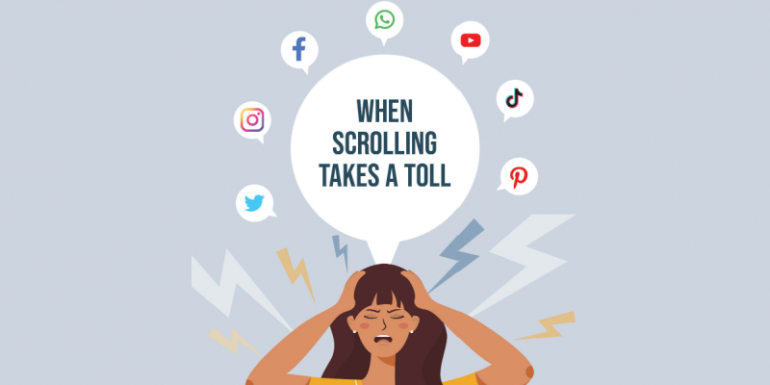By Shelby Deering
When Facebook first catapulted onto the scene more than 15 years ago, it was novel, fresh and exciting. It became a way for long-lost friends to reconnect, for grandparents to see daily pictures of their grandchildren and to get news instantaneously. And while the platform continues to offer these connections, unfortunately, it can also be a source of negativity for some.
It’s no secret that 2020, and now 2021, have been challenging for us as a society. “The pandemic, racial unrest and the presidential election made 2020 a very unusual and difficult year,” says Erin Williams, Psy. D., Licensed Clinical Psychologist at Advocate Aurora Health.
Williams explains that with the lack of social connection throughout the pandemic, many of us have relied upon social media for comfort.
“Humans are social beings and are hardwired for connection,” says Dr. Shilagh Mirgain, a psychologist at UW Health. “Having regular contact with a social support network contributes significantly to our well being. When we become isolated, our mental and physical health suffers.”
Sadly, between those pictures of puppies and laugh-out-loud memes, negative news stories and biting commentary are peppered in. Instead of experiencing the fulfilling social connections we’ve been longing for, many of us feel worse for wear after scrolling through Facebook, Instagram or Twitter. It’s something that was true before 2020, but difficult times have amplified this effect.
Studies show that social media can be detrimental to our psyches, especially for children and adolescents. This is on top of the troubled mental states that have arisen as a result of the last year.
Dr. Mirgain points to a Kaiser Family Foundation Tracking Poll from July 2020, which shared that 53% of U.S. adults reported that their mental health had been negatively affected by worry and stress over the pandemic. This was up from 32% in March.
Contributing to our worsening mental health is scrolling through negative content on social media — a term that’s called doom scrolling. Dr. Mirgain describes it as “staying glued to electronic devices to find out information on the disasters and stressors that face our country.”
“This hyper-connectivity and the constant alerts and notifications can wear us down over time and contribute to mental and physical health issues,” she adds.
With more time on our hands than ever, our minds naturally wander, and often, we find ourselves robotically scrolling. In the process, you could be unknowingly harming your mental health and overall well being. It’s important to learn how to spot the signs and train your brain to do something besides scrolling.
THE MENTAL HEALTH IMPACT
“Several studies have found a strong association between heavy social media usage and an increased risk for depression, anxiety, distorted body image, loneliness, self-harm and even suicidal thoughts and physical ailments,” Dr. Mirgain shares.
She points out certain aspects of social media that can particularly lend themselves to poor mental health, including social comparison that results from feelings of not being good enough, fear of missing out, and for teenagers, cyberbullying.
“All mental health conditions are affected by social media,” Williams summarizes. “However, research has showed increased rates of depression and anxiety with increased social media usage.”
RESULTS OF TOO MUCH SOCIAL MEDIA
One 2018 study published in the Journal of Social and Clinical Psychology says that a person should limit themselves to no more than 30 minutes of social media per day. If you find yourself scrolling more than that, your mental health conditions may permeate more and more into your daily life.
“Too much negativity via social media can result in increased negativity and fear,” Williams says, “along with having a negative view of one’s self, the world and the future.”
Your self-esteem may take a hit as well. The more you go down the social-media rabbit hole, the more you may undergo feelings of worthlessness from buying into an inauthentic, picture-perfect view of life.
“Social media allows users to selectively pick and post content, pictures and descriptions that represent positive and desirable traits. Viewing such positive content and engaging in self-comparison is associated with poorer self-esteem and self-evaluation,” Williams says.
Then there are the things that can happen to the brain itself. “When we can access social media via a touch of a finger on our laptops, smartphones or tablets at any moment, it can contribute to difficulty with impulse control, concentration, focus and disruption of sleep,” Dr. Mirgain says. “Adults spend more time behind a screen these days than they do sleeping,” she adds.
WHAT TO DO ABOUT IT
Social media can feel temporarily good for the brain. Dr. Mirgain explains it like this: “There is a reinforcing nature to social media. When we log on to see how many likes or comments we’ve received, it activates the brain’s reward center by releasing dopamine, the feel- good chemical. The uncertainty or ‘magic of maybe’ in what you might find delivers a spike in dopamine. Social media taps into the potential future reward similar to someone playing a slot machine and never knowing whether they are going to win.”
- Although that feeling is euphoric (“Look at all those likes! Everyone loves my picture! They’re all congratulating me!”), it’s short-lived, and that’s something you should remind yourself of when you catch yourself scrolling too many times throughout the day.
There are other ways to combat a dependence upon social media. Williams shares her top tips:
- Limit the amount of time you are on social media.
- Identify and use reputable sites that offer factual information.
- Follow people and things that bring you joy.
- Stay in the moment and enjoy the events that are occurring in real life.
- Remember that most people’s posts don’t always depict their negative life events, so limit the amount of self-comparison.
Dr. Mirgain also details how to consume social media in a healthy, mindful way, with these suggestions:
- When noticing the urge to check your phone, don’t. Social updates will still be there.
- If necessary, keep your phone in a bag or drawer so there will be less temptation to use it.
- Turn on “Do Not Disturb,” especially when driving or when facing a daunting task like writing a report or studying.
- Power down technology at least once a day. Whether it is the last hour of work, an hour before bed or during dinner; keep the phone powered off and away.
- Create a gadget-free zone. Research shows the importance of making the bedroom technology-free. If needed for music or alarms, switch the devices to airplane mode to help silence incoming notifications.
- Havea“digital detox day.”At least once a year, take a day or even a weekend and make it entirely free of phones, tablets, computers and even televisions.
IT’S NOT ALL BAD
One more thing to remember: There is good in social media, too. There are happy, uplifting news stories if you follow the right pages and seek out those articles. If you’re struggling with your mental health, it can be a way to connect with supportive existing friends or new friends online. You can connect to peer support networks, which may not be available in- person right now. Also, you may be able to express your thoughts and feelings easier online. These are good things, so try not to get too mired in the negativity.
And in the meantime, keep your eye out for those puppy pictures.





